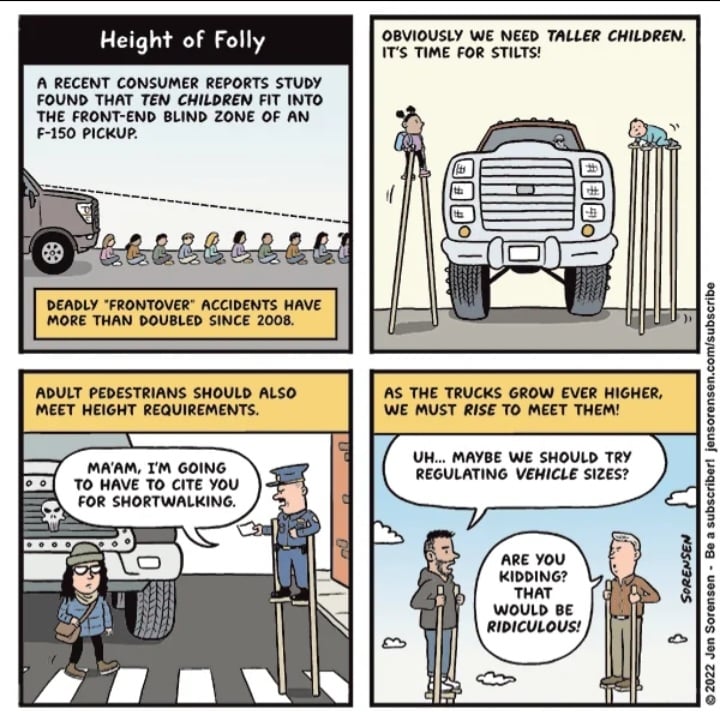Fuck Cars
A place to discuss problems of car centric infrastructure or how it hurts us all. Let's explore the bad world of Cars!
Rules
1. Be Civil
You may not agree on ideas, but please do not be needlessly rude or insulting to other people in this community.
2. No hate speech
Don't discriminate or disparage people on the basis of sex, gender, race, ethnicity, nationality, religion, or sexuality.
3. Don't harass people
Don't follow people you disagree with into multiple threads or into PMs to insult, disparage, or otherwise attack them. And certainly don't doxx any non-public figures.
4. Stay on topic
This community is about cars, their externalities in society, car-dependency, and solutions to these.
5. No reposts
Do not repost content that has already been posted in this community.
Moderator discretion will be used to judge reports with regard to the above rules.
Posting Guidelines
In the absence of a flair system on lemmy yet, let’s try to make it easier to scan through posts by type in here by using tags:
- [meta] for discussions/suggestions about this community itself
- [article] for news articles
- [blog] for any blog-style content
- [video] for video resources
- [academic] for academic studies and sources
- [discussion] for text post questions, rants, and/or discussions
- [meme] for memes
- [image] for any non-meme images
- [misc] for anything that doesn’t fall cleanly into any of the other categories
Recommended communities:
view the rest of the comments

It's almost as if government regulation is a problem.
It's not that simple. In the US at least it's more of a case of standards that created an accidental loophole, which could have been closed quickly, but because car manufacturers found it so profitable they have fought ever since to keep the rules from being revised. When the original cafe standards were passed trucks were actual utilitarian vehicles and CAFE did a lot to raise average mileage. It's time to stop exempting trucks and SUVs.
It’s always some particular thing, but the pattern is clear. Government lacks the agility to correct its own mistakes, and they get carved in stone and last for years or decades before the mistakes are corrected.
Government is like a child who places his hand on the stove, and then must get consensus among every neuron in his brain before removing the hand. Someone then says “government tends to burn its hands on the stove” and someone else says “yes but only because of how stupidly the reflex was handled”.
In reality, a child who puts his hand on the stove benefits from the decentralized nervous system. The decision to whip the hand back off the stove is made at the spine, before the brain is aware.
Excessive government regulation mandates not only constraints and goals, but methods of implementation. And again, and again, and again, our society ends up with third degree burns as a result of government ordering the hand onto the stove, then lacking the efficiency to bring it back off again.
Are you saying government regulation as it is now is a problem, or are you suggesting that in a truly free market the car companies would stop making giant trucks despite it being their bestseller?
Generally speaking, government regulation has the property of producing problems like this one: it slices the world into categories, and those get set as rigid law.
But real world success comes from real time modification of categories, the merging and splitting of categories into whatever’s most useful. To kitchen designer, a cabinet is either a wall or a base cabinet. To a gunfighter, a cabinet is either solid cover or insufficient. To a cat, a cabinet is either rough enough to hook his claws into and climb, or not. To a kid, a cabinet is either a good place to hide during hide-and-seek, or not.
Categories need to be variable based on the goals at hand.
This thing with the truck design forced to fit a local maximum of value within the constraints created by those categories, is yet another example of the same thing happening.
In simpler terms, people need to be free to make decisions in order to produce value and things that work well. Excessive government regulation prevents those choices or makes their context artificial. The result can be absurdity at best, and utter failure and ruin at worst.
I'm saying two wrongs don't make a right.
Incoherent
Word
You're partly right. The implementation of government regulation is a problem. Lawmakers are, for the most part, absolutely incompetent when it comes to making effective regulation.
So perhaps the idea that government regulation will go as expected is what’s wrong.
Perhaps when new regulation is considered, one should try to imagine ways it could go wrong, if implemented by fallible people in chaotic organizations.
It is, but largely because money in politics and regulatory capture have made the machine work against the people.
It is always a problem.